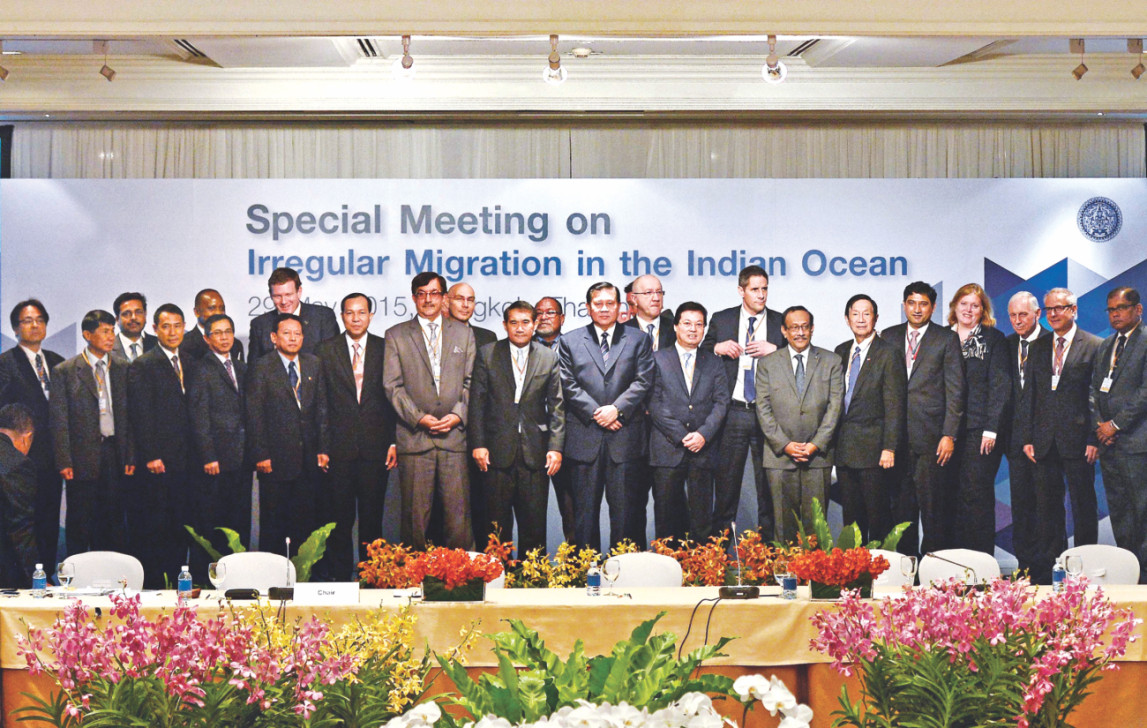
Rohingya migrants on a drifting boat in the Thai waters off the southern island of Koh Lipe in the Andaman on May 14, 2015.
Southeast Asian nations agreed yesterday to intensify search and rescue efforts to help vulnerable “boat people” stranded in the region’s seas, as Myanmar said its navy had seized a vessel off its coast with more than 700 migrants aboard.
More than 4,000 migrants have landed in Indonesia, Malaysia, Thailand, Myanmar and Bangladesh since Thailand launched a crackdown on people-smuggling gangs this month. Around 2,000 may still be adrift in boats on the Andaman Sea and Bay of Bengal, the United Nations said.
Countries affected by the crisis agreed at a meeting in Bangkok to set up an anti-trafficking task force and approved a wide-ranging list of recommendations to tackle the “root causes” of the crisis – although the plan was carefully worded to avoid upsetting Myanmar, which denies it is the source of the problem.
Just as the meeting was wrapping up in Bangkok, Myanmar’s Ministry of Information announced its navy had intercepted a boat with 727 “Bengalis” aboard and was taking them to a base on an island off its southern coast to determine their identity.
“That the summit took place at all with this wide participation is itself a good result,” William Lacy Swing, director general of the International Organisation for Migration (IOM), told Reuters.
“It’s a very important first step. Having Myanmar there was key. I’m pretty optimistic. We’re pleased that they’ve retained an emphasis on intensifying search and rescue operations.”
While some of the migrants are Bangladeshis escaping poverty at home, many are members of Myanmar’s 1.1 million Rohingya Muslim minority who live in apartheid-like conditions in the country’s Rakhine state.
Myanmar does not consider the Rohingya citizens, rendering them effectively stateless, while denying it discriminates against them or that they are fleeing persecution. It does not call them Rohingya but refers to them as Bengalis, indicating they are from Bangladesh.
The final statement from the meeting yesterday included a paragraph that called for addressing factors in the areas of origin of migrants, including “promoting full respect for human rights” as well as investing in economic development. It did not mention Myanmar by name.

Myanmar signed off on the agreement, Htein Lin, director general at Myanmar’s Ministry of Foreign Affairs and head of the country’s delegation told Reuters after the meeting.
“It’s not only about Rohingya, in your terms – in our terms, not only for Bengalis,” he said.
“The language [in the document] speaks for itself. For Myanmar, root causes are development and a sense of security for all people living in Rakhine state and the rest of Myanmar.”
‘NO FINGER POINTING’
The Bangkok gathering brought together 17 countries from the Association of Southeast Asian Nations (ASEAN) and elsewhere in Asia, along with the United States, Switzerland and international bodies such as the UNHCR, the UN’s refugee agency, and the IOM.
One delegate said Myanmar had pushed for other participants not to use the term “Rohingya” and that most were respecting Myanmar’s request.
Htein Lin said nobody had raised “the Rohingya question”.
In his opening remarks to the meeting earlier, Htein Lin had sharp words for those that blamed Myanmar for Southeast Asia’s migrant crisis.
“You cannot single out my country,” he told delegates. “In the influx of migration, Myanmar is not the only country.”
“Finger-pointing will not serve any purpose. It will take us nowhere.”
The boat people issue is a challenge to all in this region, he said. “Each and every sovereign state has its own challenges. But some fall within the domestic jurisdiction.”
Giving an account of steps taken by his government, he said his country issued a press release on May 19 “on three essential elements”.
Besides expressing concern for the boatpeople, the press release detailed the response to the situation and directives for the country’s navy and Air Force for search and rescue mission.
Myanmar has formed a committee headed by a vice minister, tasking it with, among several things, working out practical mechanism to stop illegal trafficking, he said.
Volker Turk, Assistant High Commissioner for Protection at the UNHCR, said earlier the deadly pattern of migration could only be ended if Myanmar addressed discrimination against its Rohingya minority.
“This is a very good beginning,” Turk said after the meeting. “There is a strong paragraph on root causes in the agreement… There is a sense of opening from Myanmar that I welcome. There was a discussion about Rakhine State.”
There were also pledges of money to help deal with the crisis from the United States, Australia and Japan.
Source: The Daily Star









